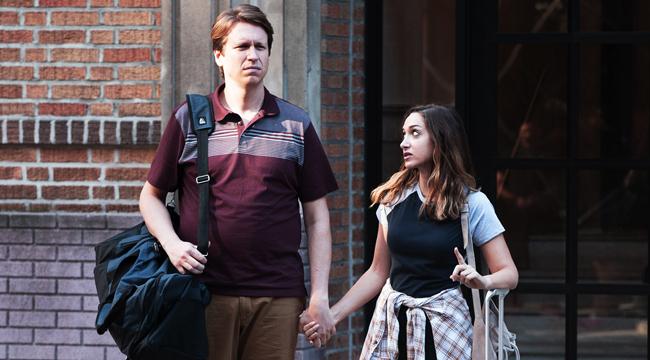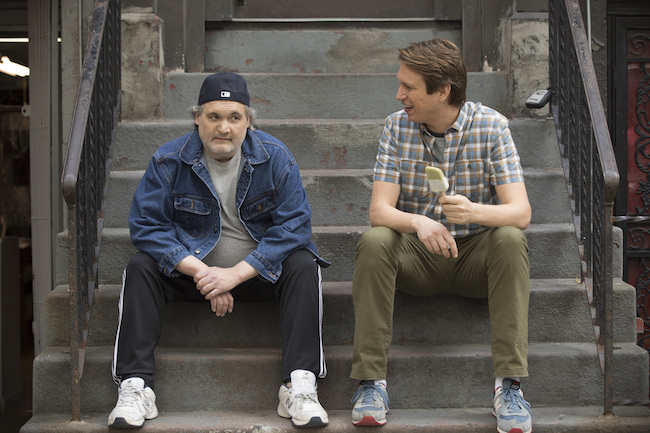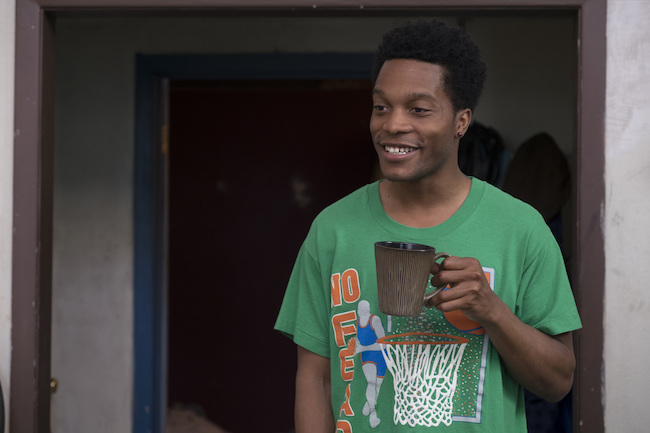
When movies and TV portray the struggles of stand-up comics, there’s often a moment of victory, that moment where our hero tells the perfect joke, performs just the right set, and you can see their future laid out before them. They’ve made it. Well, we’re nearly two seasons into Crashing, and Pete still hasn’t had his moment. Whenever he seems on the cusp of success, either the world or his own bumbling snatches the dream away. It may make for occasionally awkward viewing, but it certainly feels truer.
Loosely based on the life and career experiences of comedian Pete Holmes, Crashing has taken the “comedian makes a show about themselves” formula and turned it on its head for HBO. We had a chance to sit down at SCAD aTVfest with Holmes, comedians and co-stars Jamie Lee and Jermaine Fowler, and producer Oren Brimer to discuss the resonance and appeal of Crashing, once they could stop gushing about The Marvelous Mrs. Maisel (they are all huge fans).
Did you really make a lasagna after a hookup?
Pete Holmes: Yes. That’s a great question. No one has asked me on the record. But that’s a real thing. First of all people, I saw a couple of people talking about you can’t just pour raw pasta into a tray and put sauce on it. Yes, you can.
Jamie Lee: You can.
I did not know that. I assumed a fire was going to be next when the scene started.
Holmes: I would have thought the same thing if I didn’t know Prego Pasta Bake was a thing. Which doesn’t exist anymore. But our wonderful props people made a thing of Prego Pasta Bake, because it really happened. I made it, I put it on a glass table that belonged to my mother that was from the ’70s. It was really thick — they don’t even make them like that anymore — and it cracked just exactly like it happened on the show. But it was me and my ex-wife’s table. Which explains why she left.
Why do you think it is about Crashing that resonates with people?
Holmes: I think the joke that is now a joke that I always make is that it’s called Crashing and not Flourishing. It’s very deliberate. I know. Guys.
Oren Brimer: It’s the first time he’s serious when he says this.
Holmes: I’m serious! But that is what I think people like about it potentially. And I’d love to hear what everyone else has to say. We also have really great cameos. Love me some cameos.
Jermaine Fowler: Definitely.
Are you coming back on the show?
Fowler: I am. I’m in episode six.
Brimer: Let him finish the point.
Fowler: [Laughing.] Oh, I’m sorry. I didn’t mean to cut you off.
Holmes: No, it’s okay! But it just sounds like I said “It’s called Crashing, not Flourishing” for no reason. So what I like about the show is that the show is about the struggle.
Brimer: There we go.
Holmes: A lot of people are struggling, and I think they find solidarity in watching a show that’s not just like “Everything’s easy!” This show is about how difficult things are and that means you’re doing it correctly, and also cameos.
Fowler: Yeah. A lot of people on the show are people I really, really, really like and still to this day look up to. Like Marina [Franklin] was one person. I stole her from MySpace and I always bug her now for advice and stuff.
Holmes: Does she reply?
Fowler: Yeah, she did. She’s f*cking awesome. Marina’s the shit. Anyway. And seeing Artie [Lange], who I’m a such a fan of. Bill Burr. It’s amazing seeing these guys just like in their element. You know they’re having fun doing the show.
Lee: And Artie is a very giving guy. When I was starting out, he had a show on DirecTV and he had me on as a guest when I was like, I don’t know, only a few years into comedy. He had me on twice and had me back and I was like “Oh!” It was just very flattering and nice of him.

Good to make those connections.
Lee: Yeah.
Fowler: And these two people are f*cking awesome too. Like when I was first starting in New York, they were the few of the folks gravitating towards me. We all were in the same comedy club trying to work on our sh*t. They were like really respectful and nice and open. The show actually is real, for me at least. These people, I’m fans of them but at the same time, they’re also very good people.
Brimer: It also shows the origin story of the stand-up. Versus someone who’s already a stand-up. This is how you go from a hobbyist to a professional stand-up. That process and that journey is really fun to portray and I think people like seeing when someone is starting from the beginning.
Fowler: Also, one more thing: So, usually when you watch a movie or a TV show when the guy or the girl gets f*cked over by their lover or whatever, they’re just the antagonist the entire time and you don’t really see much of them. In the first season, I just loved how Lauren Lapkus was still a part of his life throughout the show. It just felt fresh to me. I don’t really see that too often.
Holmes: That’s kind of what’s it about. It’s making friends with your pain. Bad things happen to you. He literally makes friends with it. That’s why he literally makes friends with his ex-wife and the person that had sex with his ex-wife. And he’s making friends with the struggle of stand-up. Crashing not Flourishing! Hashtag. People are hashtagging conversations now. Sorry, Jamie. Something about Marvelous Mrs. Maisel?
Lee: Just another quick thing about how I relate to her. I don’t remember what I was going to say, but it doesn’t matter.
Holmes: One of the things that I actually — and I’m 100% joking by that of course — I thought you were going to talk about how in season 2 we steer away from the idea that Jamie is like… I think people might think we’re going to explore the differences for a woman, because that’s the question I’ve seen Jamie get a lot. “What’s it like being a woman in stand-up?” And on our show, we kind of flip that and she’s very experienced and she’s guiding Pete. Which I’m very excited about. I think we’re making a statement by not talking about it. There’s no episode that’s like, “They didn’t let me on the line-up because there’s too many girls!”
Lee: Yeah I think that’s a really good point because I do get that question a lot, what it’s like to be a girl in stand-up. I think when you’re starting out you don’t really think about that. Maybe now if I started now I would because of the current climate, with me doing Time’s Up, I think we’re constantly thinking about it. But when I was starting out I think I actually tried to forget it, because I felt like if I gave in to that idea that maybe my path was more struggle than for other people, I would just think about that all the time and I would never actually focus on just trying to get good. So, I think the subtlety that Pete speaks to is what it was like for me. Which is that there would be these little weird microaggressions from other comedians and I didn’t read into it because again I wasn’t trying to allow myself to read into it. But now looking back at that time, I’m like “Yeah, that was fucking weird.”
Fowler: Jamie was to busy killing it.
Lee: Oh my God. Jermaine’s really my publicist. He’s been so busy hyping me up.
So you’re her publicist and she’s Mrs. Maisel.
Lee: So we have a ring going.
You mentioned Time’s Up. I mean, there’s no way you guys could see this coming, but I think the episode that deals with the aftermath of when you guys hook up and the differences of perception of what it was to each other has a really interesting nuance.
Holmes: I also think it was interesting that we took a traditionally female perspective and gave it to Pete. But what’s interesting, maybe even more than that, is that it wasn’t because that’s fun or cute or interesting. It’s to represent my people, guys like me that happen to think that sex is a big deal. And people also pointed out that I ask for consent. Which — you’re absolutely right, you know how TV works — we shot months and months and months, and had written it months and months and months before any of this happened. There’s just like a world of creative types of sensitive, artist-y people that are sweet, and that was just a true story. Almost all of that is inspired by something true.

I feel like in comedy, there’s sort of a shift happening a little bit in terms of representation and diversity. What do you hope to see going forward as more voices are brought to the forefront?
Fowler: More black sh*t.
Holmes: I was going to say more black sh*t! But it’s true. I actually get embarrassed now when I watch old TV, and I’m like “This is humiliating.” Because comedy especially, again I don’t know why I want to make such a point of this, “I never was let’s be diverse.” I was like “Who’s there?” Jermaine, you were literally there. Aparna [Nancherla] was there. Whenever we went that way, we’re just recreating what the world actually is, which is diverse.
But also even apart from that, even if it happened to be more white bread, we want more voices. Now I look at the old TV and even some TV that’s still being made and I feel like it can be not great. Only one perspective can be boring.
Lee: When I was 11 or 12, I got really into Margaret Cho. I got really obsessed with this one special she had, and I saw her when she came to Dallas. My mom and I went to see her. I just got so obsessed with her, and she was kind of like the only comedian I knew about. Which is so crazy, because I think now looking back, I think I just really loved that not only was she hilarious, but she was a really funny woman. I think I was identifying with her even more than I realized. And so I feel like that’s why — to bring it back to your question — that’s why diversity and representation are so important, especially in comedy, because you need to feel spoken to. That’s the only way you connect. To have someone who’s kind of like you, or at least echoing things that you think are important, is so satisfying as a viewer and a listener.
Holmes: And then, just like the real world, you don’t make a big thing of it. You’re just like “That’s normal.” There should be a lot of women there. There should be a lot of non-white men.
Brimer: Everyone’s invited to be funny in this world.
Holmes: Right. And that’s what the world is like. It would have been dishonest to do it any other way.
Crashing airs Sunday nights at 10:30 pm ET on HBO.






